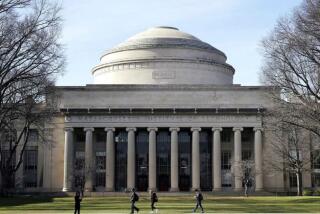Pakistan’s scientists under scrutiny
- Share via
ISLAMABAD, Pakistan — The day after Pakistan handed over Yemeni microbiologist Jamil Qasim Saeed Mohammed to U.S. agents, authorities stepped up their search for other scientists and students who may have maintained links to Osama bin Laden’s al-Qaida network, Pakistani intelligence sources said this week.
What gave the search a new sense of urgency was Saeed’s being the third scientist in a week to have been arrested in Pakistan. Two retired Pakistani nuclear scientists who visited Afghanistan frequently were also detained.
Officially, Pakistan never admits terrorism suspects have been handed over to the United States, but a Pakistani intelligence source said “deportations of foreigners to the U.S. are not unusual.”
In Washington, Secretary of State Colin Powell was asked Wednesday about the arrests and the general issue of the safety of nuclear weapons in Pakistan.
“I discussed this issue with President [Pervez] Musharraf when I was in Islamabad,” Powell said, “and I’m confident that he understands the importance of ensuring that elements of his nuclear program are safe and secure.”
Musharraf “knows that if he needs any technical assistance on how to improve that security level, we would be more than willing to help in any way we can,” Powell said.
Triggers for violence
Saeed’s handover showed just how secretive and sensitive such operations are in a nation where the government knows Islamic radicals could turn such issues into noisy and violent street protests if they became public.
After Washington announced Saeed had been handed over, senior Pakistani officials continued to deny that the transfer had taken place. The government still has not officially confirmed Saeed was given to the U.S.
Intelligence sources said Saeed was smuggled out of the port city of Karachi at night. It is presumed that a Jordanian national identified as Zaid Safarani was spirited out of the country on the same plane. Both are wanted by the United States in the attacks on its embassies in Kenya and Tanzania and on the destroyer USS Cole in Yemen.
Sources said Saeed was taken to Karachi airport at 1 a.m. in a vehicle with darkened windows. Masked men drove him to a remote tarmac where a plane was parked.
According to witnesses the plane was unmarked and serviced by a private contractor instead of the usual airport authorities. Traffic control reported the plane came from and returned to Amman, Jordan.
Saeed and another man, believed to be Safarani, were pushed up a gangway into the plane. The masked men joined them aboard.
U.S. seeks 241
On Monday a Pakistani military source said the U.S. had provided his country a list of 241 suspected terrorists with possible links to al-Qaida. He could not say how many on the list are scientists or science students but said the hunt for such people had intensified.
Al-Qaida is known to have canvassed for biological weapons and nuclear technology for years. As early as 1993 an al-Qaida agent approached a Sudanese general to buy enriched uranium from South Africa.
Taliban ambassador Abdul Salam Zaeef flatly denied reports his country may possess nuclear weapons.
“A country which does not have facilities to manufacture glass must not be expected to have sophisticated items like nuclear weapons,” he said.
Pakistan, where Islamic fundamentalism thrives among militant and virtually autonomous Pashtun villagers along the long Afghan-Pakistani border, has always been considered a near perfect refuge for terrorists looking for a haven.
The country, which has good international air links and a porous border, provides easy access to Afghanistan.
“We have alerted all border points to watch out for those named on the blacklist,” a government spokesman said.
Saeed, who studied and did research at Karachi University starting in 1993, vanished from the campus in early October, only days before the Interior Ministry started to make inquiries about his movements, his study plans and his habits.
Nuclear scientists interrogated
Meanwhile, intelligence sources said Washington had asked that the two senior Pakistani scientists be extradited to the U.S. for questioning over their possible contacts with al-Qaida. Pakistan turned down the request as “too sensitive.” As a compromise, the sources said, authorities agreed to arrest and interrogate the two.
The same sources said it was likely U.S. agents would have access to the interrogations.
In an attempt to minimize fear that the scientists had leaked sensitive technological information, Pakistani Brig. Gen. Rashid Qereshi said last weekend that the two were cooperating to clarify some issues and would be “set free within a few days.”
The scientists, Bashir Mehmood, 55, and Abdul Majeed, 62, were key members of Islamabad’s nuclear program. Both played prominent roles in making Pakistan the first Muslim nation to have nuclear arms.
In addition, both have been advocates for Muslim fundamentalism and have sympathized with the aims of radical Islamic movements who want to force the West to change its policies in the Middle East.
Mehmood, described by academics as a world expert in recycling heavy water, resigned from the nuclear program in 1998 to protest the decision by then-Prime Minister Nawaz Sharif to sign the nuclear non-proliferation treaty.
An author of science fiction novels with Islamic themes, Mehmood frequently visited the Taliban’s stronghold of Kandahar after his resignation.
After his resignation he formed the Ummah Tameer-e-Nau organization affiliated with the Al-Rashid Trust, one of the organizations blacklisted by the United States for alleged contacts with terrorism.
More to Read
Sign up for Essential California
The most important California stories and recommendations in your inbox every morning.
You may occasionally receive promotional content from the Los Angeles Times.













